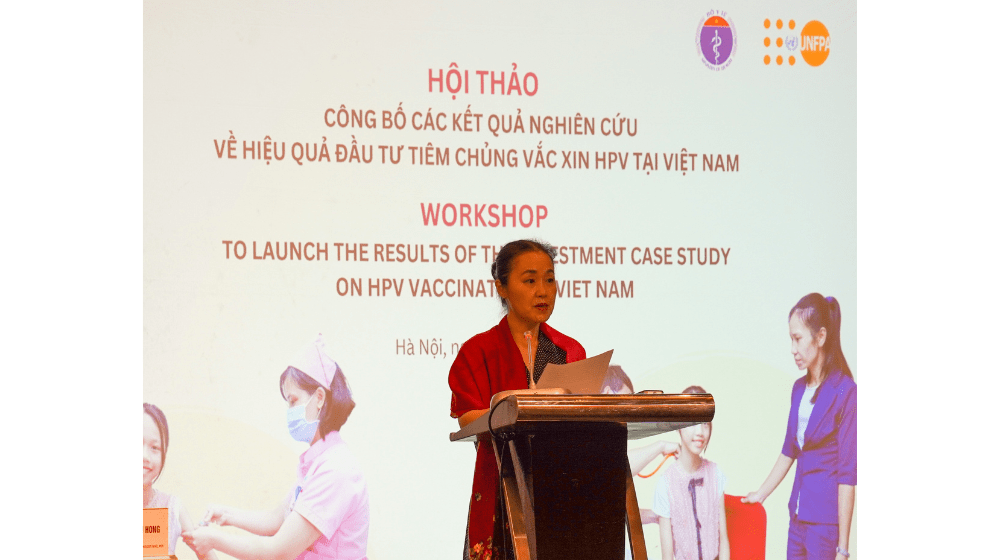- Dr. Nguyen Minh Hang, Deputy Director of General Department of Preventive Medicine, Ministry of Health;
- Associate Professor Duong Thi Hong, Acting Director, Viet Nam National Institute of Hygiene and Epidemiology; Ministry of Health;
- Representatives from concerned departments of the MOH and Research and Training Institutions;
- Representatives from other line ministries, National Assembly and Government Office;
- Representatives and colleagues from UN agencies, civil society-based organizations, and private sector;
- Representatives from national media
It is my honour to welcome you all to this special event to launch the findings of the Investment Case Study on HPV Vaccination in Vietnam. The Study was undertaken by UNFPA in collaboration with the Ministry of Health, Victoria Institute of Strategic Economic Studies of the Victoria University, and the Daffodil Centre of the University of Sydney. The study is a joint effort to generate evidence on quality and cost-effectiveness to inform the national and sub-national policies on cervical cancer prevention.
Cervical cancer, which is caused by the human papillomavirus (HPV), is a major public health concern worldwide, including in Vietnam. In 2018, cervical cancer was the sixth most common cancer among Vietnamese women, with nearly 4,200 new cases and 2,420 deaths.
We need to remind ourselves that this is preventable. The WHO Global Strategy for cervical cancer elimination by 2030 calls on all countries in the world to have vaccinated 90% of girls against HPV by age 15. We need 70% of women to have screening for cervical cancer. And we aim to get 90% of all women who have been found to have pre-cancer or cancer to get access to a treatment.
So, what is the situation of HPV vaccination in Vietnam to date? Unfortunately, in Vietnam, the HPV vaccination rate and the cervical cancer screening rate are low. According to the SDGs Survey on Women and Children, which was conducted by GSO in 2018 with support from UNFPA and UNICEF, only 12% of women and girls aged 15-29 are vaccinated, and only 28% of women aged 30-49 have been screened so far.
Against this background, the Investment Case Study on HPV Vaccination in Vietnam is very crucial as it provides quality evidence on the impact of different cervical cancer prevention strategies including HPV vaccination and cervical cancer screening. By estimating effectiveness, costs required, cost-effectiveness, a return of investment, and the timeline to eliminate cervical cancer of different programme strategies, the findings of the study will inform national and sub-national policy makers on the effective roll-out of HPV vaccination for adolescent girls and cervical cancer screening for women in Vietnam.
Dear participants,
In a couple of minutes, our researchers will present to you the key findings from their comprehensive analysis of a wide range of data sources to demonstrate the cost-effectiveness, and economic and social returns of HPV vaccination. We trust that validated evidence presented in this meeting will provide a signal for policy makers, health professionals, civil society organizations, researchers, and development partners to advocate for and roll out on the implementation of plans for cervical cancer prevention and control, and align and accelerate the efforts towards cervical-cancer free future for Viet Nam.
I would like to take this opportunity to express our sincere thanks to Dr Kim Sweeny from the Victoria Institute of Strategic Economic Studies, and Dr Diep Nguyen from the Daffodil Centre of the University of Sydney for completing this demanding study. I also thank Prof Duong Thi Hong, as well as representatives from the Ministry of Health and other partners for active contributions to various parts of this study.
Let me assure you that UNFPA is fully committed to supporting the Government of Viet Nam and its partners in rolling out HPV vaccination in the country, so that the sexual and reproductive health status of Vietnamese women is improved, and this is a critical part of achieving Sustainable Development Goals by 2030.
No husband should lose a wife, no sibling should lose a sister, no parents should lose a daughter and no child should lose a mother, just because of cervical cancer. Women and girls must claim this right because they are essential in the country.
Thank you for your attention.


